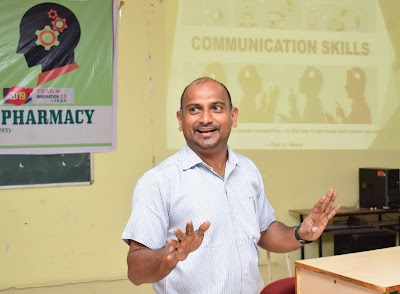Want to become a writer at Eat My News? Here is an opportunity to join the Board of Young Leaders Program by Eat My News. Click here to know more: bit.ly/boardofyoungleaders
1. Tell us more about your experience as an educator.
I started my career as a researcher in different parts of the country during graduate studies, doctoral research and visited countries such as Germany and others in Europe during my postdoctoral research work and initiated to learn from different educator before starting my career as educator.
A teacher is an educator, motivator, role model, supporter, and many more for a student. The teaching must be in a friendly way and has to motivate the students to learn. Learning doesn’t come by force, it should have to come by interest. Education/educator has to create interest and curiosity for the students to learn in a greater extent than mere memorizing the content of the subject taught to them. They should inculcate creativity in the heart of the students.
As a teacher, we meet many students with varying talents and need to foster them towards productivity. Teachers can help students identify their strengths and nourish it and identify their weaknesses and overcome them.
Teaching and learning is not only the part of academic institutes but it is spread everywhere. We can learn from nature and surroundings throughout our life and spread it.
2. What is your opinion of the Indian education system and how would you like to change that?
According to my view, the education system has to focus on practical training and skill development and prepare students for jobs in the market.
Most of the schools at present spoon feeds the children and kills the creativity inside them. The students lack lateral and analytical thinking capability. The educational institutes in general should not be business-minded and focus on the output quality of the students rather than output quantity alone.
There are a lot of quality boards like International Organization for Standardization (ISO), National Assessment and Accreditation Council (NAAC), National Board of Accreditation (NBA) which assess every institute for their standards in teaching and promote continuous improvement in their education system. These accreditations are being made important and compulsory for all the educational institutes. Recently, the Government has proposed a new education policy to reform the entire education system in the country.
These will bring about a change in the education system of the country.
3. What changes in the teaching methodologies have you seen in the recent times?
The education system and teaching had been under the great influence with information technology and its advancements for a long time. The advent of COVID-19 had paced this influence and now the teaching has taken a big turn.
Now the classes are moved as online classes, seminars are webinars, guest lectures are online training and much more. Usage of application such as Google classroom, Google meet, ZOOM, Microsoft teams, Webex, Team Link connect students with the educator during difficult situation and also made international talks with experts in the field, anywhere in the world, effortless.
All the books which were available in the printed format are now available online on the internet and extended with a wide range of knowledge and learning tools.
4. How does education help one do well in their career?
Education has a massive hand in one’s career. Education gives the desired technical knowledge and skill for the job requirement. With proper education and the right skills, one can achieve big in their life and live an elevated lifestyle.
5. Do you think teaching as a profession is viewed at par with corporate jobs?
The teaching profession is not seen at par with corporate jobs. People are paid more in the corporate sector than in the academic sector. The society forces a human, from his early adulthood, to earn more and makes him feel that money is everything. Hence after graduation, the student would opt for a profession where you can earn high in number. Even he opts for a course to earn a large amount of money than his interest and skill set.
The academic regulating bodies have revised the pay scales of academics to be in par with the corporate, but still, it is the last choice as a profession.
Teachers are unique and you need a different set of skills and a big heart to be in the profession of teacher. The success of a teacher is shaping a good human and involves self-satisfaction.
6. How can we adopt technology to make teaching more effective?
As said before, technology has made the teaching and learning process in a much comfortable way. Applications of ICT in a classroom, smart classrooms, etc are already in academic teaching. With advancements like virtual reality (VR), augmented reality (AR), the teaching profession will leap forward. The possibility of viewing the subject in a virtual approach rather than in a theoretical prospect will make the learning easier and faster.
7. Why does India need more educators like you?
Teachers willing to learn are required in society and exposure to different environment such as internship, research training etc other than class room learning. If you stop learning, your knowledge would be static, it has to be always in flow and updated regularly.
Teachers must nourish the skill of a student and develop self-sustaining capacity among the students. All these must be done in a more friendly environment.










0 Comments